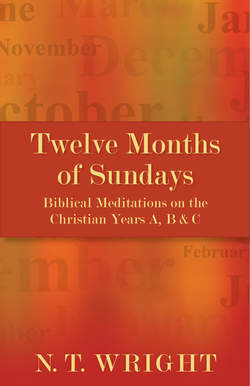Читать книгу Twelve Months of Sundays - N.T. Wright - Страница 41
На сайте Литреса книга снята с продажи.
ОглавлениеThe Seventh Sunday of Easter
(Sunday after Ascension Day)
Acts 1.6–14
1 Peter 4.12–14; 5.6–11
John 17.1–11
‘When his glory is revealed.’ The ascension gives us a glimpse in advance of the great truth which will one day be unveiled – or rather, the glorious Person who will one day be revealed. It is as though the universe is throbbing with the secret knowledge that Jesus, the Messiah, is its true Lord, a knowledge that cannot yet be spoken, that would not be understood. To be a Christian is to be privy to this secret, to have it indeed engraved into one’s life; because the other side of the secret is the Christian call to suffer. The transformation of suffering is a further key part of the meaning of the ascension.
The ‘suffering’ that comfortable Western Christians endure often seems small in comparison with that which our brothers and sisters still face day by day in (for instance) the Sudan. Much of it – the stresses of contemporary life and all that they produce – is partly self-caused, at least at a societal level. But there is a deep suffering, unquantifiable and hence impossible to compare, which comes from living as one who believes that the crucified Messiah is the world’s true Lord, in the midst of a world that lives by the rule of force, or pleasure, or wealth. We are called to be out of tune with the world’s orchestra, swimming against the world’s wind and tide. Not merely cross-grained and awkward; rather, in tune with God’s hidden music, buoyed up by the submerged swell of his love.
It is therefore vital to remember that the ascended Lord is precisely the one who was crucified. In John’s Gospel, indeed, reaching something of a climax in the great prayer of ch. 17, crucifixion and exaltation seem to be merged together, so that the ascension, when it is promised in John 20.17, does not ‘reveal his glory’ any more fully than the cross itself.
Without this, Acts 1 would simply be a triumphalist rant. In Luke’s readers’ world, the way Roman emperors were formally declared divine after their deaths was to have someone declare that they had seen him ascend into heaven. Ascension was the instrument of power and glory: the power of the Roman state to keep subject peoples controlled with religious, as much as military, threat; the glory of the imperial system and the all-powerful person at the top of it.
For Luke, however, as the whole of Acts makes clear, the fact that it was the crucified Jesus who was now exalted to share the throne of the one true God (he has Daniel 7 in mind as well, of course) means that the mission of his followers will carry power, and indeed glory, but of a very different sort. It will be the power, and the glory, of suffering love. When Jesus speaks of the glory the Father had given to him being shared with his followers (John 17.22), this seems to be central to what he has in mind.
